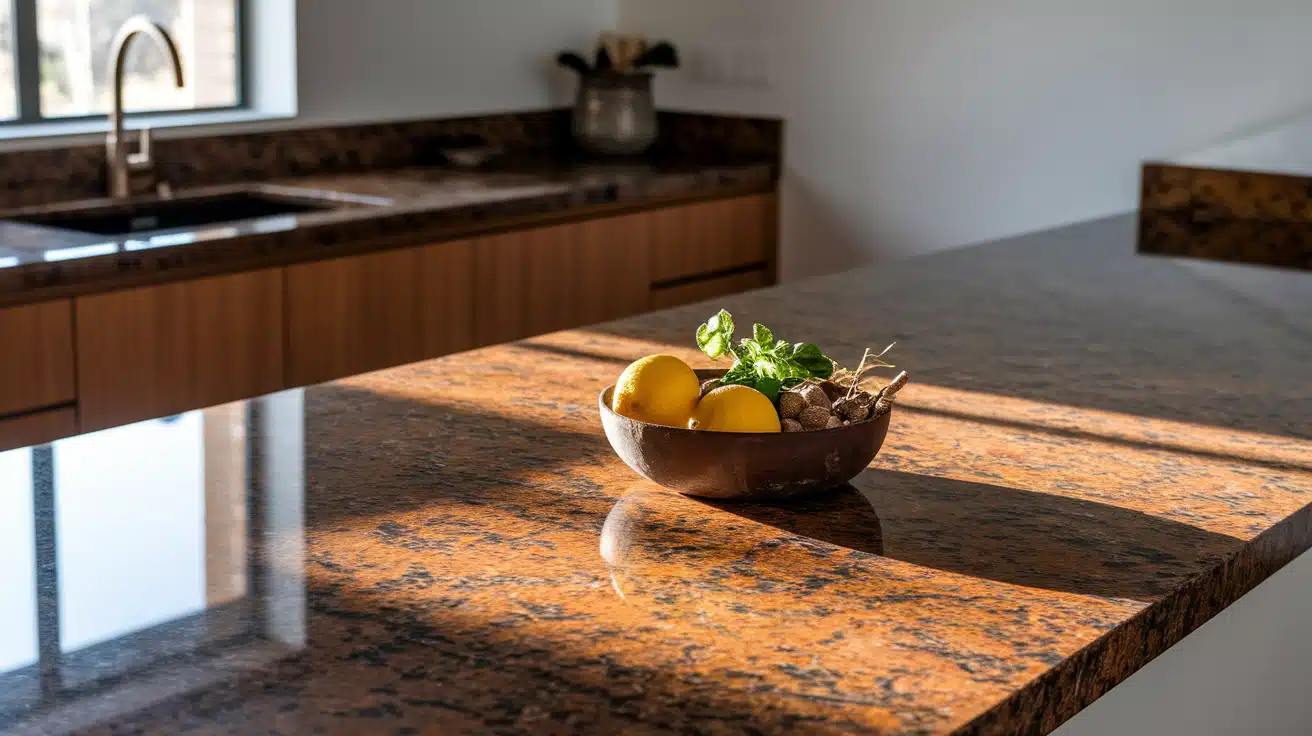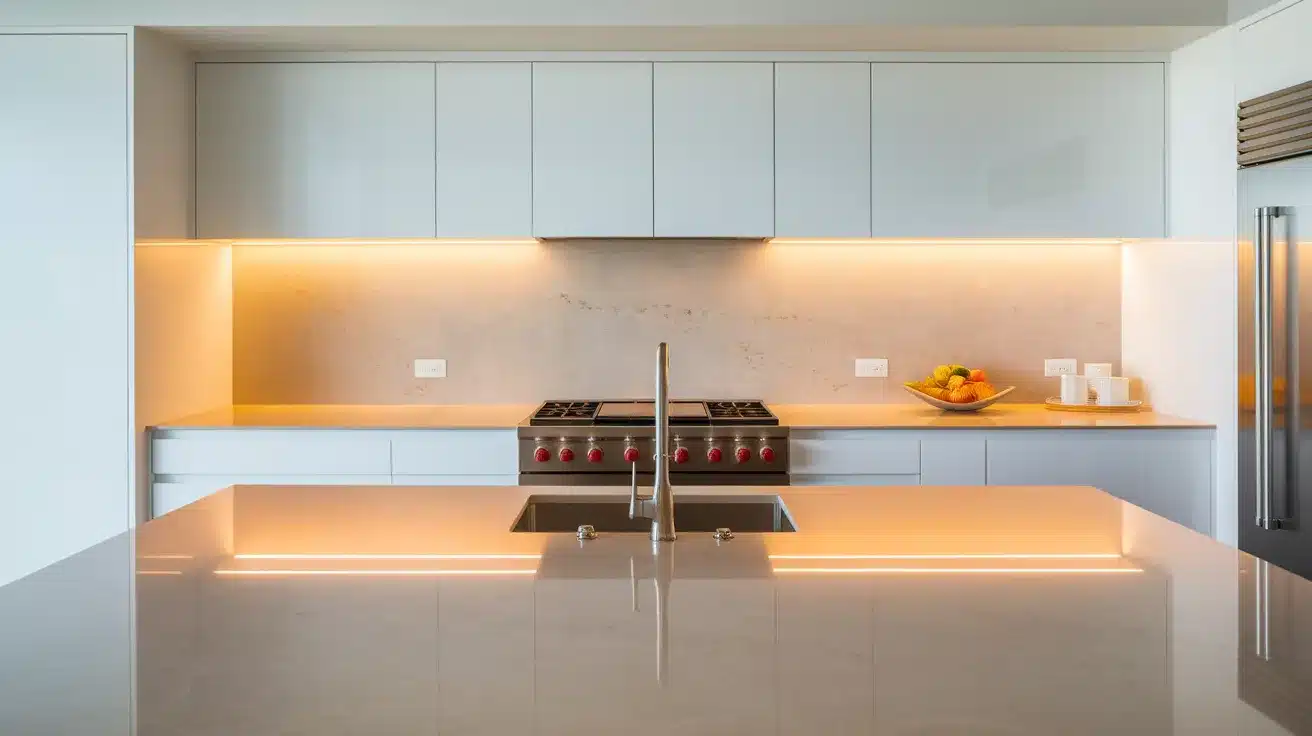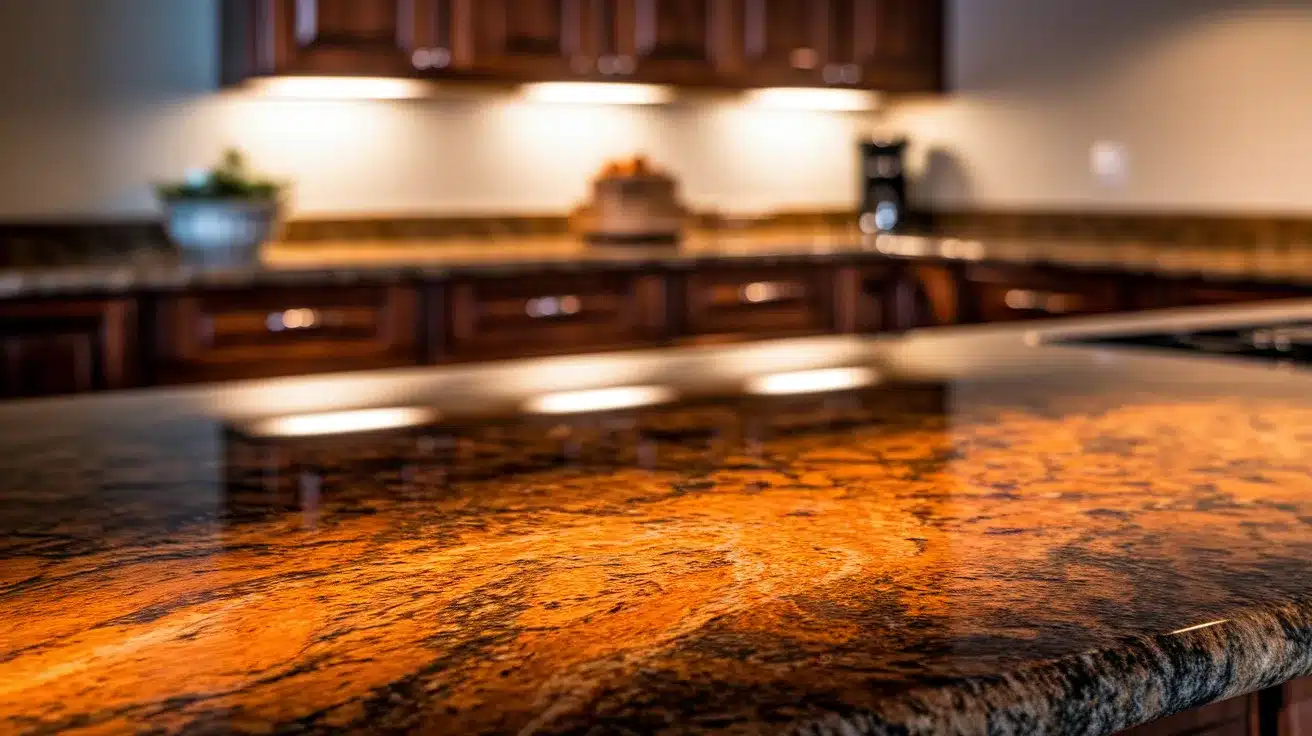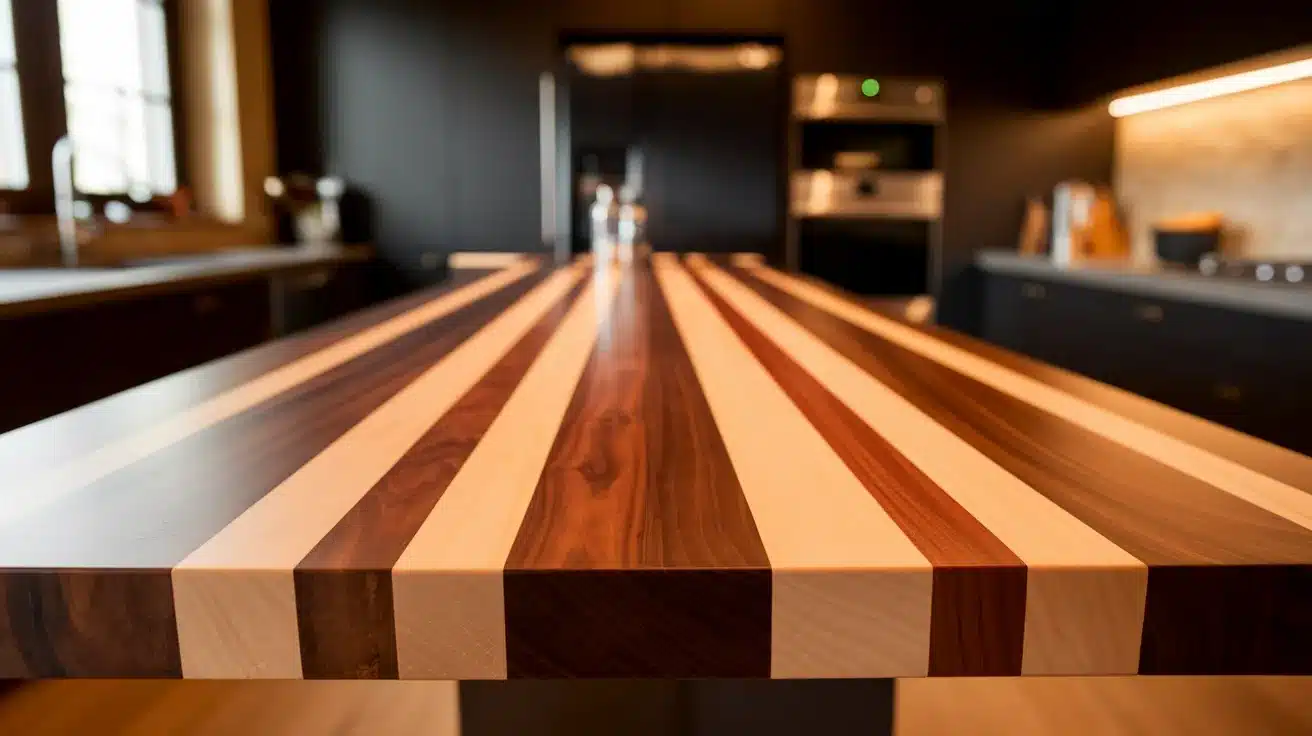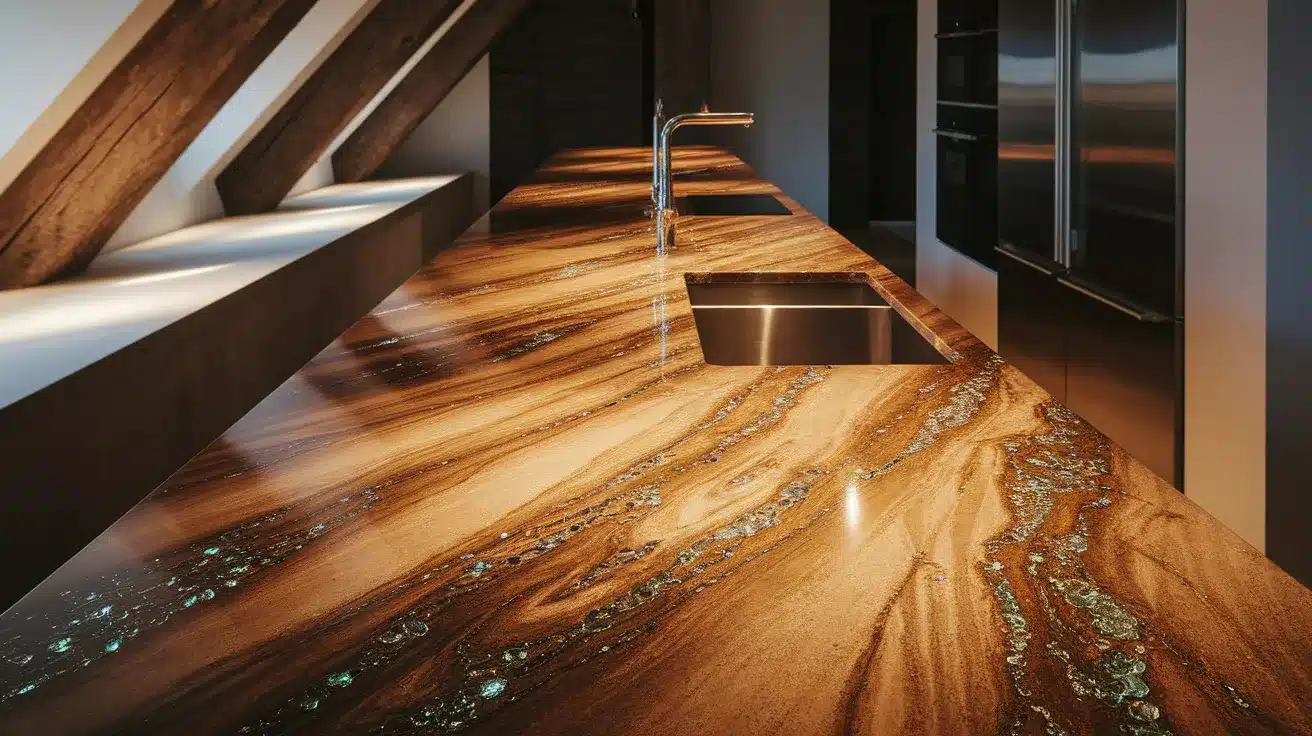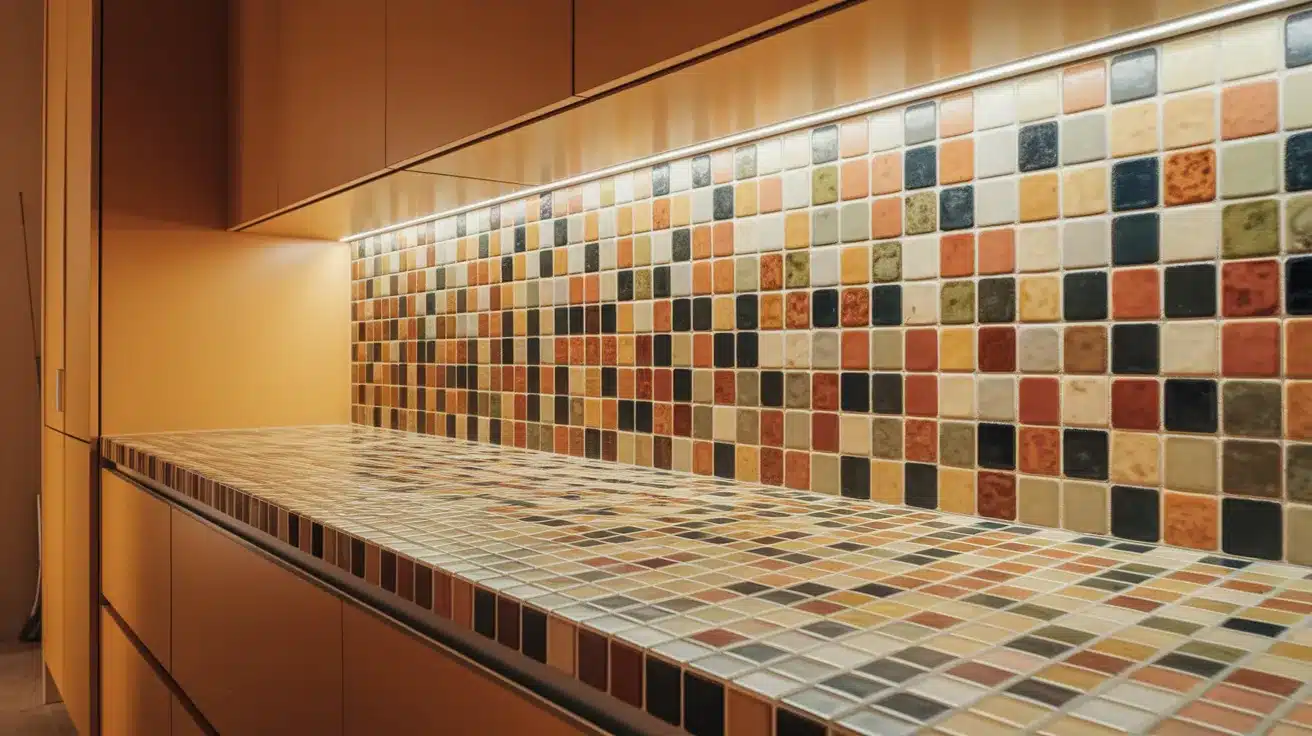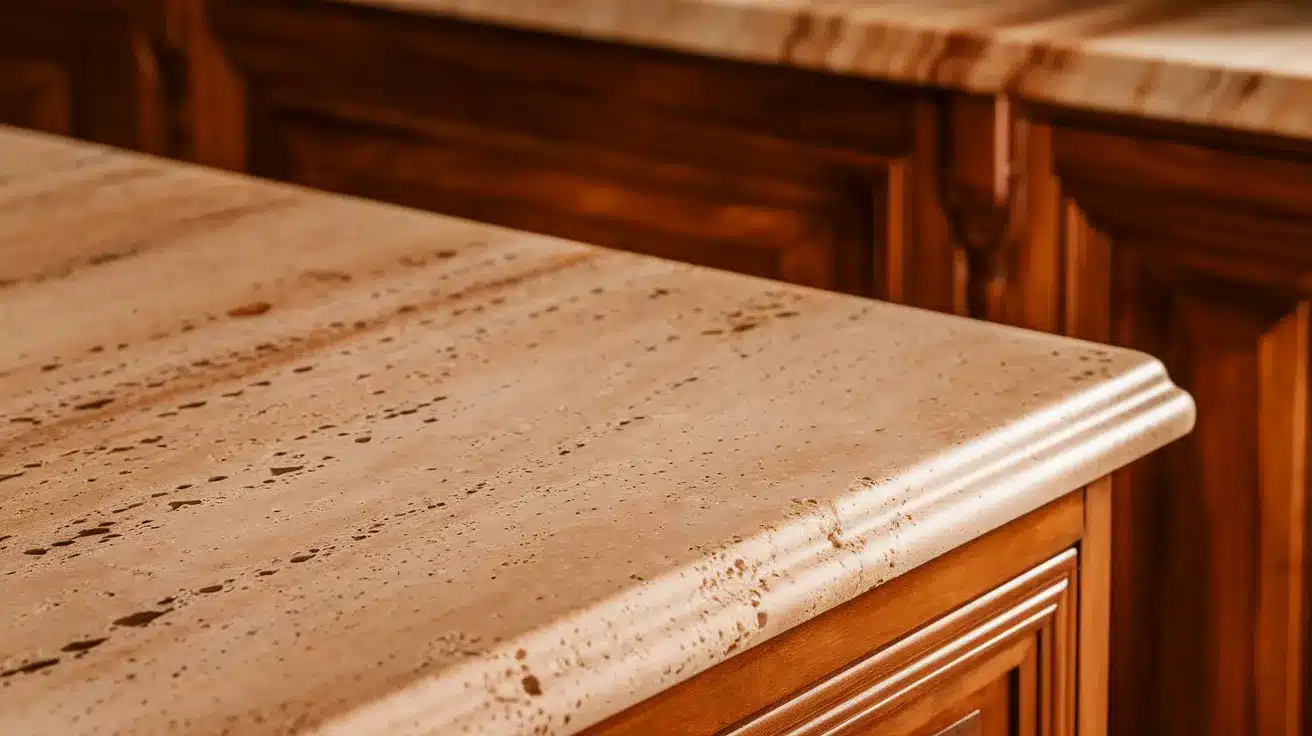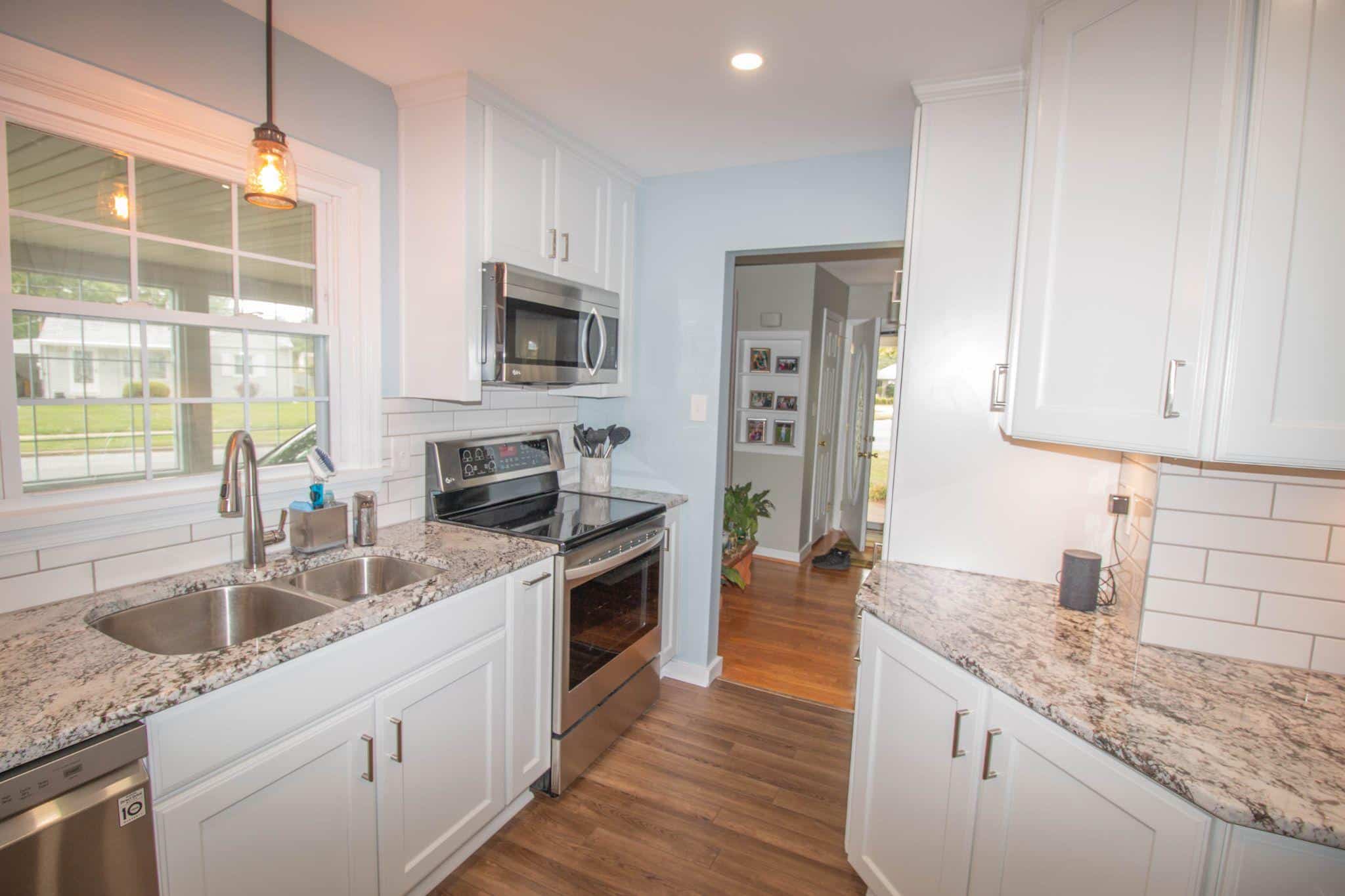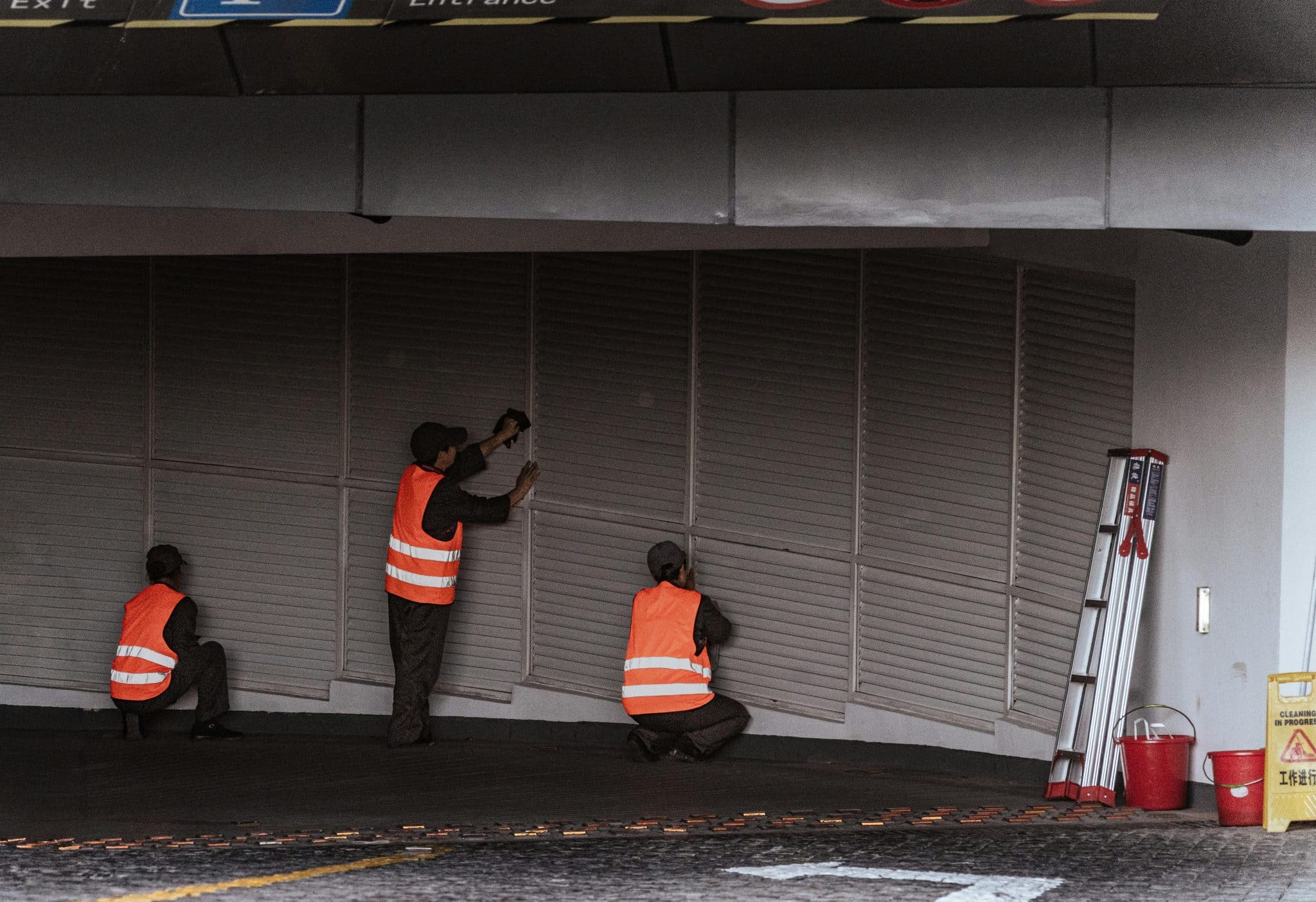Your kitchen countertop takes a beating every single day. Hot pans slam down on it. Sharp knives slice across it. Coffee spills happen at 6 AM when you’re barely awake. Yet somehow, you expect it to look perfect for years to come.
Here’s the truth: most homeowners pick the wrong countertop material. They fall for attractive showroom displays or choose based solely on price. Then they live with daily frustration for the next 15 years.
But it doesn’t have to be this way. The right kitchen countertop material exists for your specific needs and budget. This guide reveals top options with honest pros and cons for each.
Countertop Showdown: 13 Materials That Define Your Kitchen
Find the kitchen countertops — from timeless granite to modern porcelain, we break down 13 top materials by cost, durability, and style to help you find your perfect match.
1. Quartz (Engineered Stone)
Quartz countertops are made by combining natural quartz crystals with resins and pigments. This engineered material offers consistent patterns and colors. Unlike natural stone, quartz doesn’t need sealing.
Most homeowners love quartz for busy kitchens. It handles daily cooking without showing wear. The non-porous surface resists bacteria and stains naturally.
- Cost: $50-$90 per square foot installed
- Durability: Extremely high – heat, stain, and scratch-resistant
- Aesthetic: Available in various colors/patterns, mimics natural stone
2. Granite
Granite forms deep in the earth from cooled magma. Each slab shows unique patterns and colors. This natural stone has been a kitchen favorite for decades.
Professional installation is required due to the weight of granite. The stone needs periodic sealing to maintain its stain resistance. Many homeowners choose granite for its timeless appeal.
- Cost: $40-$80 per square foot installed
- Durability: Very durable, though it requires periodic sealing
- Aesthetic: Natural, timeless, with unique patterns
Check out the full breakdown of granite countertops pros and cons to see if it's the right fit for your home and lifestyle.
3. Marble
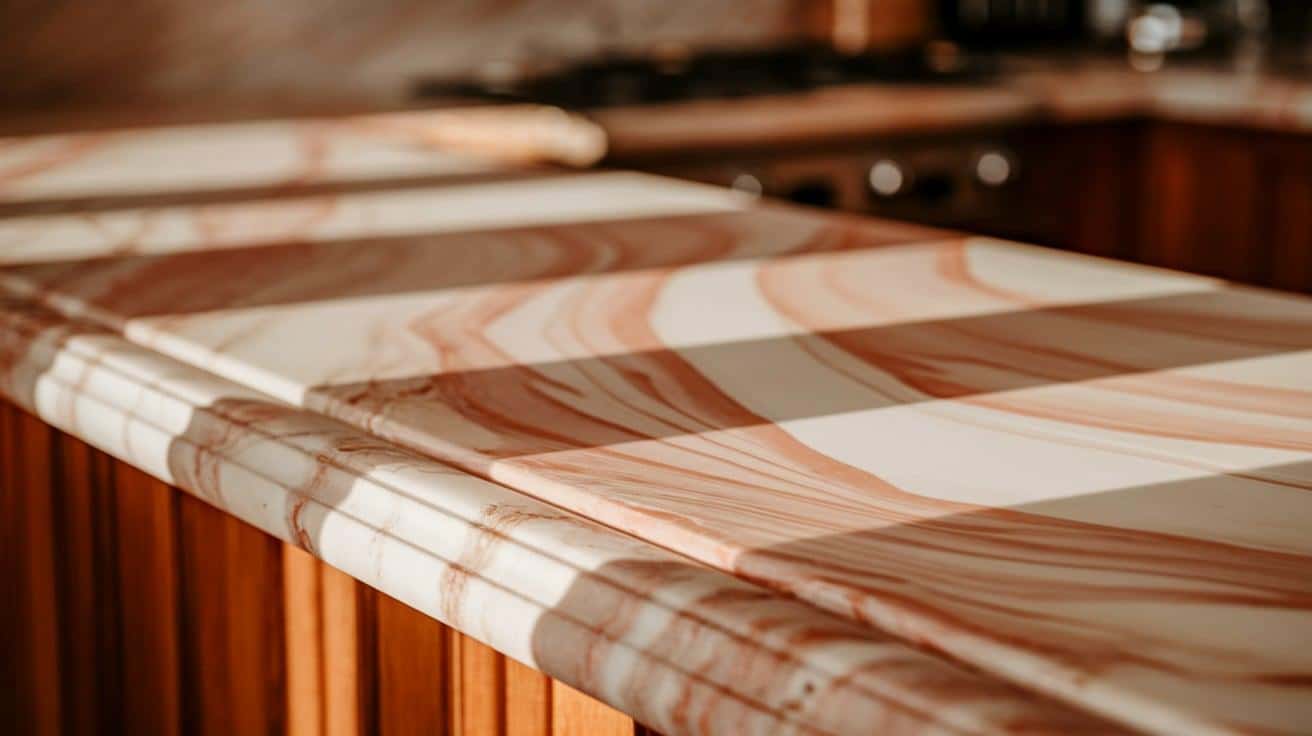
Marble brings luxury to any kitchen space. This natural stone forms from limestone under heat and pressure. Famous marble types include Carrara and Calacatta.
Baking enthusiasts prefer marble for pastry work. The cool surface helps with dough preparation. However, marble needs careful maintenance to prevent damage.
- Cost: $60-$120 per square foot installed
- Durability: Softer, more porous – prone to scratching/staining
- Aesthetic: Classic, high-end appeal with natural veining
Struggling while cleaning your marble countertops? Read our full blog on how to clean marble countertops, let your countertop shine with this guide.
4. Solid Surface (e.g., Corian)
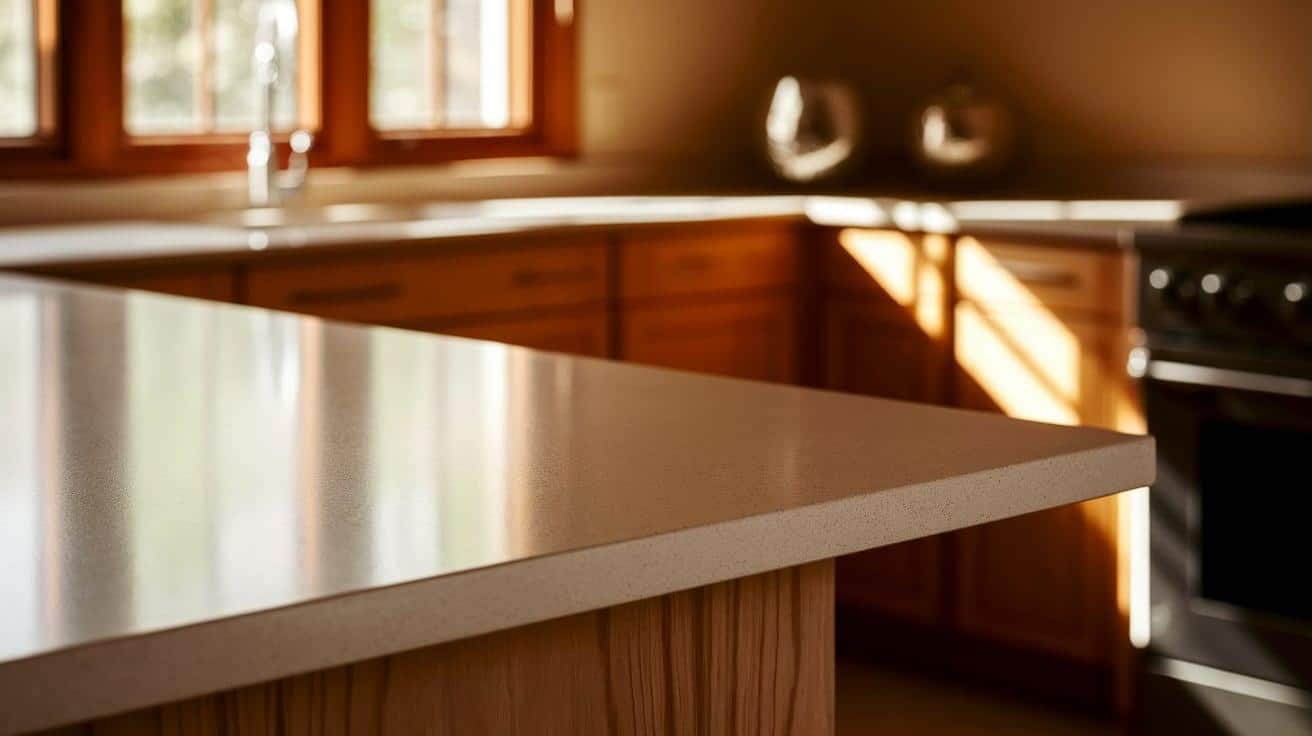
Solid surface materials blend acrylic resins with natural minerals. Corian is the most well-known brand in this category. These countertops offer seamless installation options.
Scratches and minor damage can be sanded out easily. This repairability makes solid surface ideal for busy families. The material comes in hundreds of colors and patterns.
- Cost: $35-$70 per square foot installed
- Durability: Moderately durable, scratchable but repairable
- Aesthetic: Seamless look, wide color availability
5. Butcher Block (Wood)
Wood countertops bring warmth to kitchen designs. Hardwoods like maple, oak, and walnut work best. The wood strips are glued together for strength.
Regular oiling keeps wood countertops looking fresh. These surfaces are perfect for food prep and cutting. However, they need protection from moisture and heat.
- Cost: $30-$60 per square foot installed
- Durability: Prone to scratches and water damage without maintenance
- Aesthetic: Warm, rustic, and natural
Ready to get the most out of your butcher block? Learn the steps to seal, protect, and enhance its natural beauty. Don’t miss my guide on how to perfectly finish your butcher block countertop—your dream kitchen deserves it!
6. Concrete
Concrete countertops offer unlimited customization options. They’re poured and shaped on-site to fit perfectly. Colors, textures, and embedded objects create unique looks.
The industrial style works well in modern kitchens. Concrete can include decorative aggregates or glass pieces. Proper sealing protects against stains and moisture.
- Cost: $45-$85 per square foot installed
- Durability: Strong but requires sealing; prone to cracks
- Aesthetic: Modern industrial look, customizable
7. Laminate
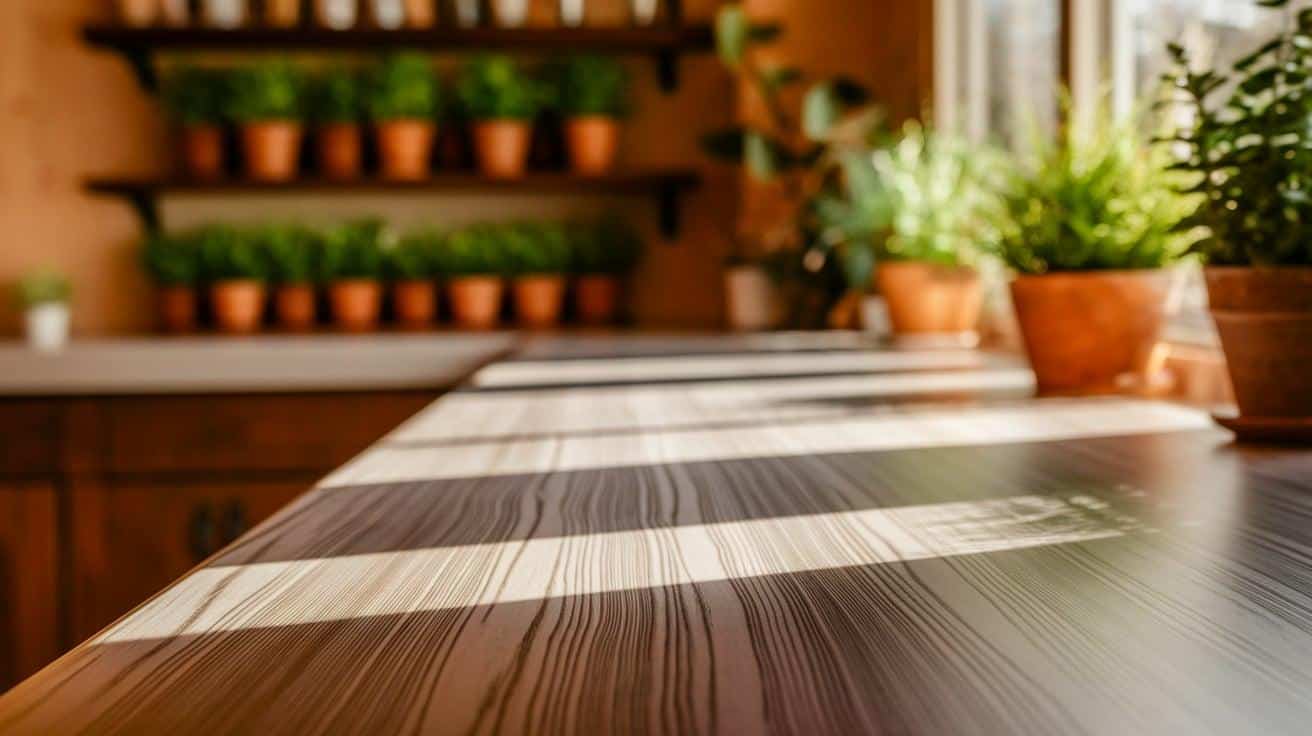
Laminate countertops use layers of paper and resin over particleboard. Modern laminates look much better than older versions. They come in realistic stone and wood patterns.
Budget-conscious homeowners often choose laminate first. Installation is straightforward for DIY projects. However, damage from heat or cuts shows easily.
- Cost: $10-$30 per square foot installed
- Durability: Susceptible to scratches and heat damage
- Aesthetic: Many designs, including faux stone or wood
8. Soapstone
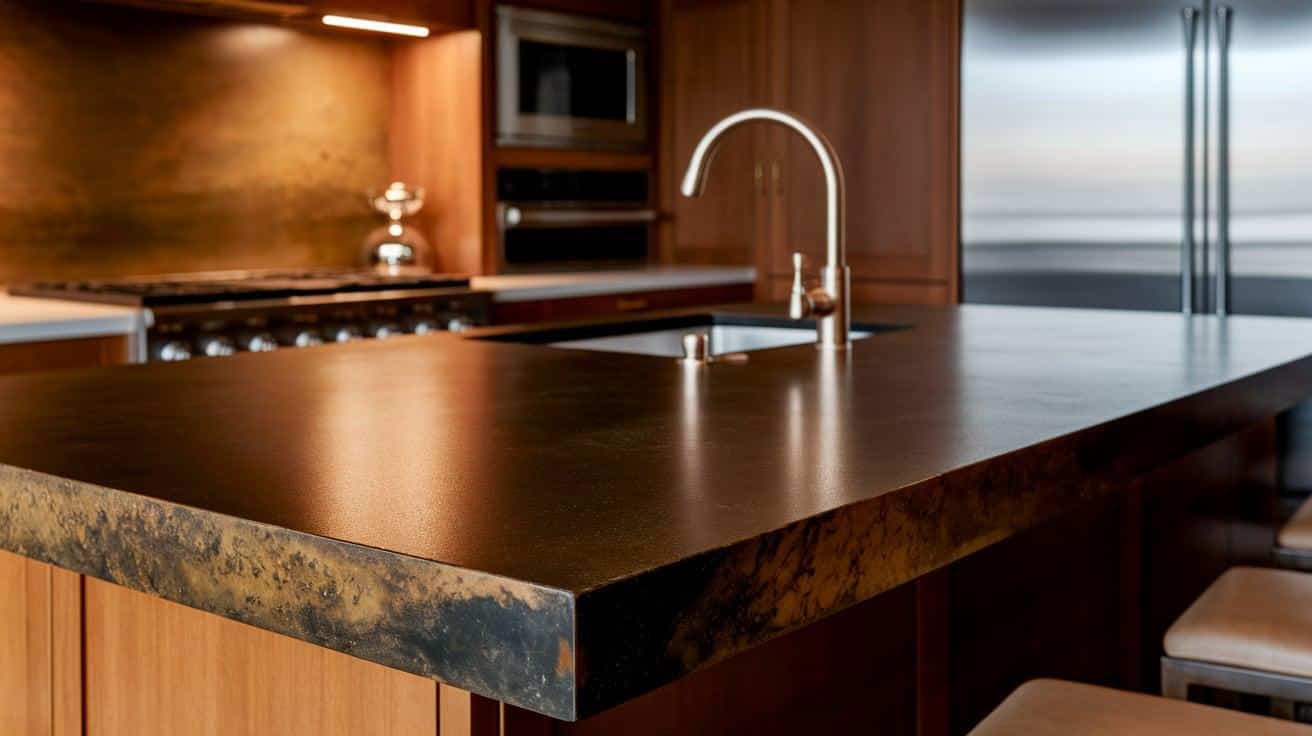
Soapstone contains talc, which gives it a soft feel. This natural stone has been used for centuries. It naturally darkens with age and use, creating character.
The material resists heat and acids naturally. Soapstone works well around stoves and sinks. Light scratches can be sanded out by hand.
- Cost: $60-$85 per square foot installed
- Durability: Stain-resistant, but can scratch and darken over time
- Aesthetic: Rich, deep matte appearance
9. Stainless Steel
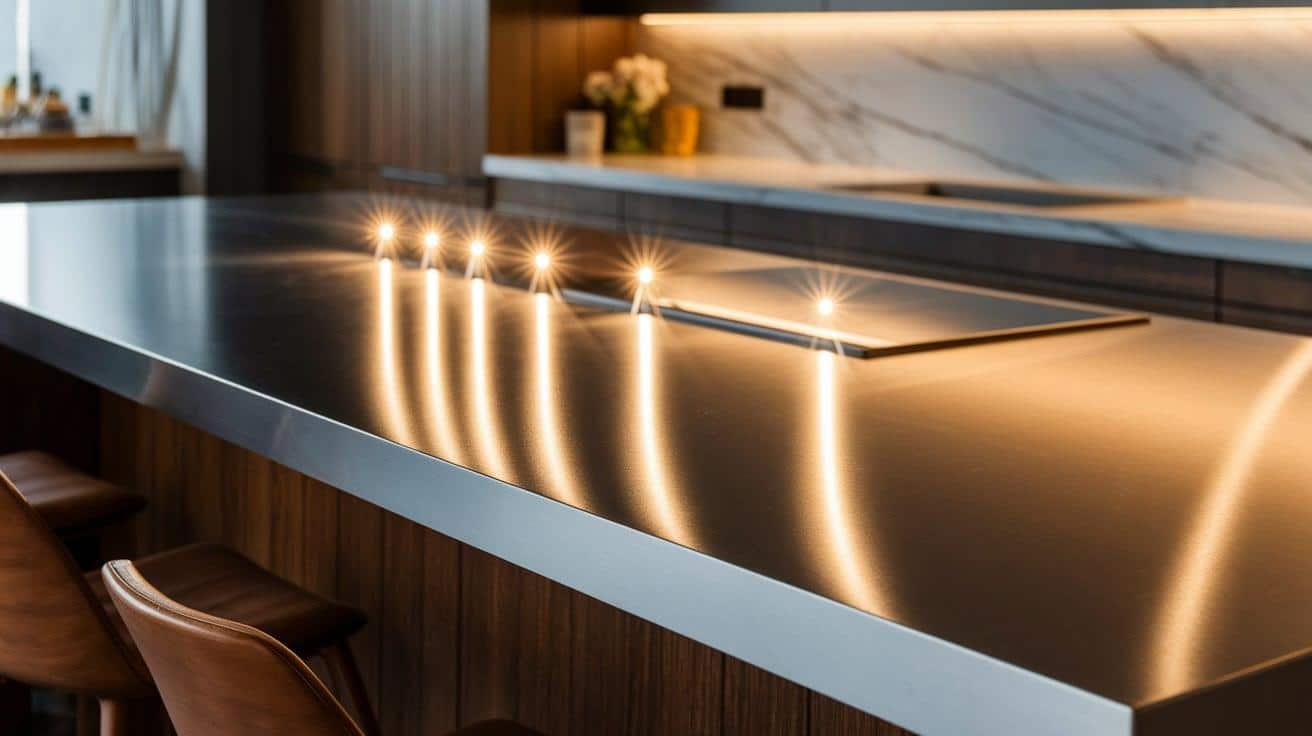
Professional kitchens rely on stainless steel surfaces. This metal resists heat, stains, and bacteria growth. It’s the most hygienic countertop option available.
Home cooks who want restaurant-style kitchens choose stainless steel. The material works especially well on kitchen islands. However, fingerprints and scratches show easily.
- Cost: $50-$100 per square foot installed
- Durability: Highly heat and stain-resistant, but scratches easily
- Aesthetic: Industrial, sleek
10. Porcelain/Ultra-Compact Surface
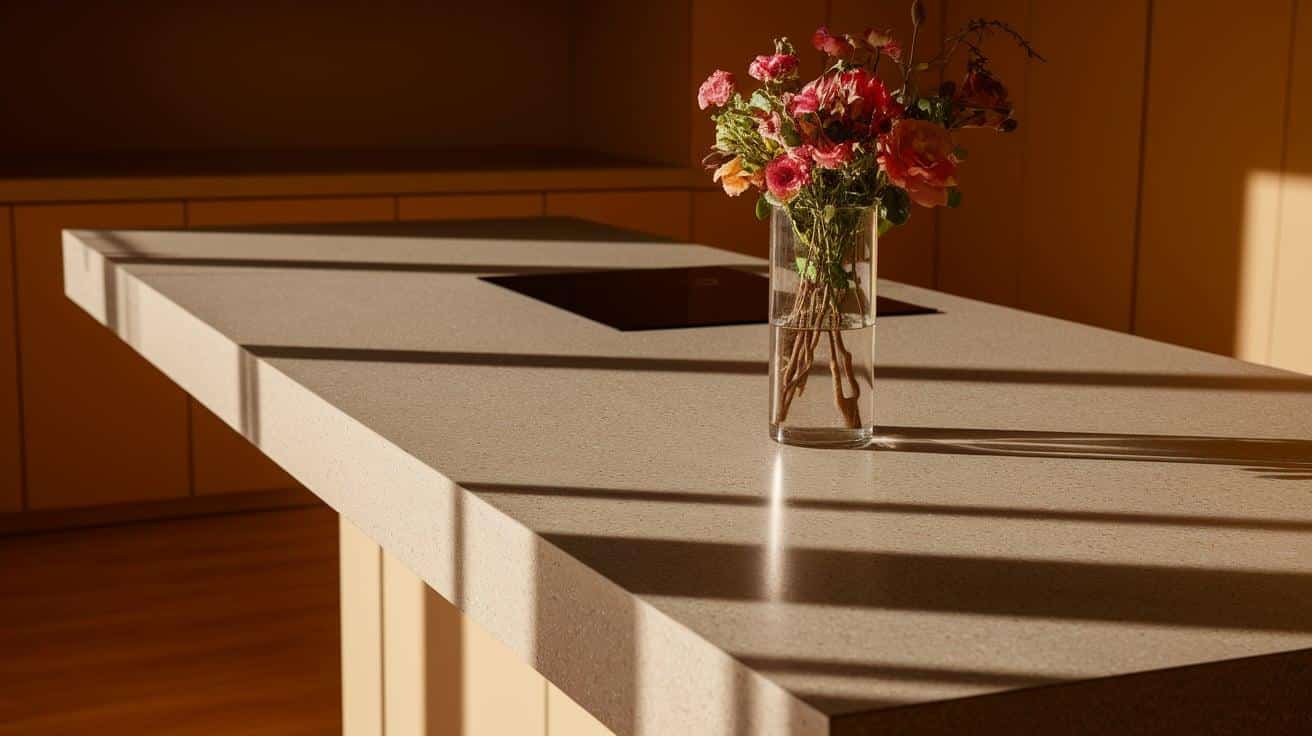
Ultra-compact surfaces use extreme pressure and heat during manufacturing. Materials like Dekton combine quartz, porcelain, and glass. The result is incredibly dense and strong.
These surfaces handle outdoor use without fading. They resist scratches better than most natural stones. The thin profile allows for modern, sleek designs.
- Cost: $60-$120 per square foot installed
- Durability: Highly resistant to heat, stains, scratches
- Aesthetic: Modern, sleek, stone, or concrete-like looks
11. Recycled Glass
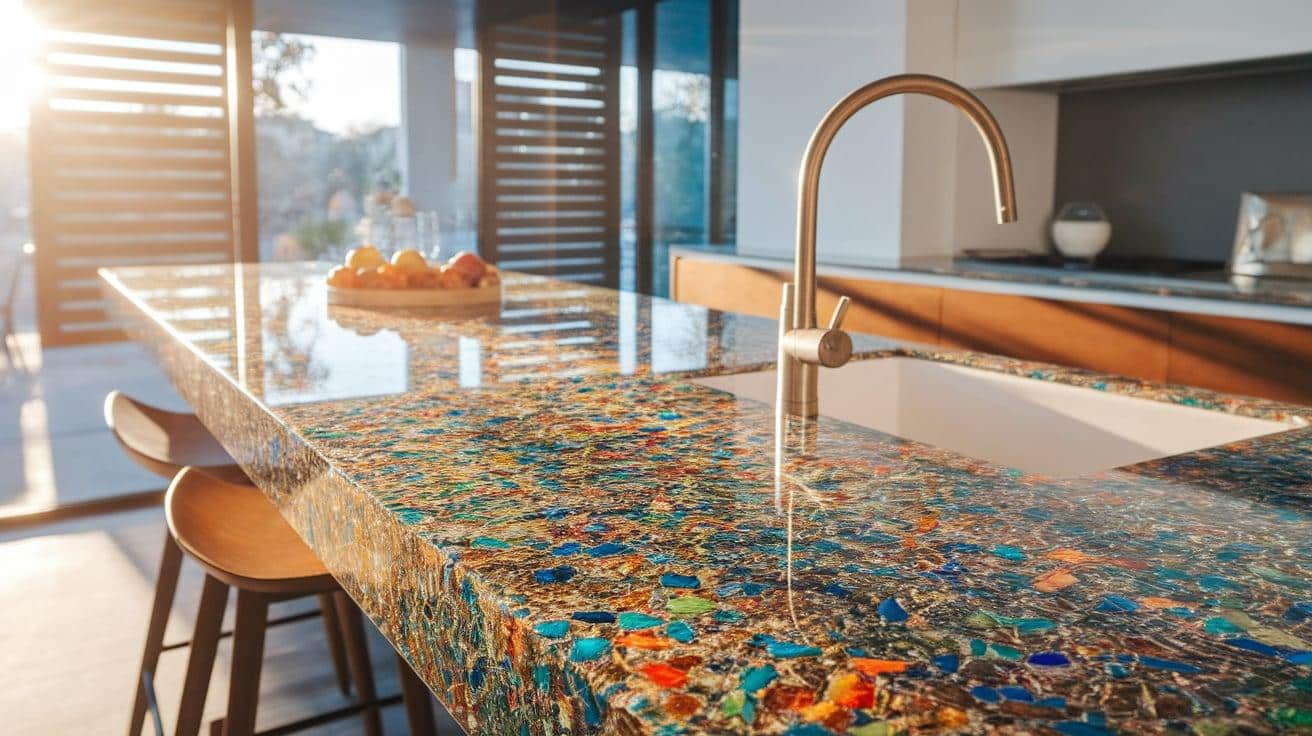
Recycled glass countertops use crushed glass in resin or concrete binders. This eco-friendly option diverts waste from landfills. The glass pieces create sparkly, colorful surfaces.
Each countertop has a unique appearance due to the varied glass content. The material works well in contemporary and eclectic kitchens. Chips can occur with a heavy impact.
- Cost: $50-$100 per square foot installed
- Durability: Fairly durable but can chip under impact
- Aesthetic: Unique, colorful, eco-conscious
12. Tile
Ceramic and porcelain tiles offer a wide range of design possibilities. Individual tiles allow for the creation of creative patterns and colors. Subway, mosaic, and large format tiles all work well.
Grout lines require regular cleaning and maintenance to prevent staining and maintain their appearance. Sealed grout resists stains better than unsealed versions. Damaged tiles can be replaced individually.
- Cost: $15-$40 per square foot installed
- Durability: Durable, but grout can stain and crack
- Aesthetic: Versatile and decorative
13. Travertine
Travertine forms from mineral deposits around hot springs. This limestone variety has natural holes and texture. It’s commonly used in Mediterranean-style kitchens.
The porous surface needs regular sealing for kitchen use. Light colors hide wear better than darker versions. Travertine pairs well with warm wood cabinets.
- Cost: $25-$50 per square foot installed
- Durability: Porous and needs sealing; can stain easily
- Aesthetic: Warm, natural earth tones
Countertop Comparison: Pros and Cons of 13 Top Materials
| Material | Pros | Cons |
|---|---|---|
| Quartz | Non-porous, low maintenance, uniform look | Expensive, not heat-proof |
| Granite | Natural beauty, durable, heat-resistant | Needs sealing, costly |
| Marble | Elegant, unique veining | Scratches/stains easily, high cost |
| Solid Surface | Seamless, repairable, and many designs | Can scratch/melt, not heat-resistant |
| Butcher Block | Warm, repairable, affordable | High maintenance, not water-resistant |
| Concrete | Customizable, industrial aesthetic | Heavy, may crack, needs sealing |
| Laminate | Budget-friendly, easy to install | Low durability, not heat/scratch-resistant |
| Soapstone | Smooth texture, stain-resistant | Soft, darkens over time, needs oiling |
| Stainless Steel | Hygienic, heat/stain-resistant | Prone to scratches, noisy |
| Porcelain/Dekton | Heat/scratch/stain-resistant, modern look | Costly, can chip |
| Recycled Glass | Eco-friendly, unique appearances | Can chip/crack, expensive |
| Tile | Affordable, wide design variety | Grout maintenance, uneven surface |
| Travertine | Aesthetic warmth, natural stone | Porous, stains easily, and needs sealing |
Factors to Consider when Choosing a Kitchen Countertop Material?
- Durability – Choose a material that can withstand scratches, heat, and daily wear.
- Maintenance – Consider the amount of upkeep, sealing, or cleaning required for the surface.
- Cost – Factor in both the upfront price and long-term maintenance costs.
- Aesthetic Appeal – Match the countertop style with your kitchen’s overall design.
- Resale Value – Some materials can increase your home’s market appeal.
- Stain Resistance – Non-porous surfaces are better at resisting stains.
- Heat Resistance – Materials like granite and stainless steel are better suited to handle hot pans.
- Scratch Resistance – Harder surfaces are less prone to knife marks and scuffs.
- Eco-Friendliness – Recycled or sustainably sourced materials are greener options.
Conclusion
The best kitchen countertop material depends on your specific needs and preferences. Consider your cooking habits, maintenance preferences, and budget. High-use kitchens benefit from durable materials like quartz or granite.
Budget-conscious homeowners can find great options in laminate or tile. Those wanting luxury should consider marble or ultra-compact surfaces. Consider your home’s resale value as well—classic materials like granite tend to appeal to most buyers.
Your kitchen countertops will serve you for many years. Take time to research each option carefully. Visit showrooms to see materials in person. Compare costs, durability, and maintenance needs.
Choose the option that best suits your lifestyle. What type of kitchen countertop material appeals to you the most?
Frequently Asked Questions
How Thick Should Kitchen Countertops Be?
Most countertops are 1.25 inches thick, but thicker options (2-3 inches) create a more substantial look.
Can I Install Kitchen Countertops Myself?
Laminate and butcher block are DIY-friendly, but stone materials require professional installation due to their weight and the precision cuts required.
How Long Do Kitchen Countertops Typically Last?
Quality materials like granite and quartz typically last 20-30 years, while laminate usually requires replacement after 10-15 years.
What’s the Most Heat-Resistant Countertop Material?
Stainless steel handles the highest temperatures, followed by granite and concrete, provided they are properly sealed.

